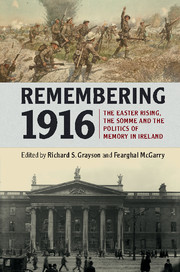Book contents
- Frontmatter
- Contents
- List of figures
- List of tables
- List of contributors
- Introduction
- Part I Memory and commemoration
- 1 Making sense of memory: coming to terms with conceptualisations of historical remembrance
- 2 Ritual, identity and nation: when the historian becomes the high priest of commemoration
- 3 ‘The Irish Republic was proclaimed by poster’: the politics of commemorating the Easter Rising
- Part II Narratives
- Part III Literary and material cultures
- Part IV Troubled memories
- Index
2 - Ritual, identity and nation: when the historian becomes the high priest of commemoration
from Part I - Memory and commemoration
Published online by Cambridge University Press: 05 March 2016
- Frontmatter
- Contents
- List of figures
- List of tables
- List of contributors
- Introduction
- Part I Memory and commemoration
- 1 Making sense of memory: coming to terms with conceptualisations of historical remembrance
- 2 Ritual, identity and nation: when the historian becomes the high priest of commemoration
- 3 ‘The Irish Republic was proclaimed by poster’: the politics of commemorating the Easter Rising
- Part II Narratives
- Part III Literary and material cultures
- Part IV Troubled memories
- Index
Summary
This chapter is an exploration, and speculative discussion, of the relationship between ritual acts of commemoration, national and ethnic identities, the discipline of history and the professional historian. It is built around a number of observations and propositions that together raise questions about the engagement of historians with commemorations for 1916. In short, I want to argue that history has a relationship with ritual commemorative practice which, due to the ideological construction of ritual commemorations, is unlike that of other academic disciplines. Consequently, the professional historian plays a legitimising role in commemorative practice by endorsing what are acts of political identity. I will make this argument through the following four propositions.
First, whilst commemorative practices appear to be about the past, they are actually about the present and the future. Commemorations are a way of capturing the sacrifices of the past for the legitimation of the political present and the imagined political future. Consequently, the nature of contemporary acts of commemoration is better understood by exploring the relationship between identity and contemporary politics than by examining the event being ‘remembered’.
Second, the discipline of history plays a role in modern Irish society that has a different status from related subjects in the humanities and the social sciences. Our identities, particularly as imagined communities such as nations, but also as ethnic groups, are invariably built around a historical narrative. As an explanatory tool for understanding ‘who we are’, history is predominant. Thus, in popular culture, the examination of group identities is usually undertaken by narrative histories. Disciplines such as anthropology, sociology, social psychology, political science and social psychology are better at dealing with the identity questions, but in popular discourse, they are less often utilised. The status that history has, over and above allied disciplines, is most clearly operative in the school curriculum but is also predominant in the popular media, particularly with regard to commemorative practice.
Third, commemorations are conducted by the utilisation of symbols endowed through acts of ritual. To understand how commemorations are controlled, we must understand the nature of ritual practice. Rituals appear to defy time by linking participants with the past. Through culturally embedded practice, the rituals form part of a narrative that imbues groups with a past that suggests they are in communion with those that are being remembered.
- Type
- Chapter
- Information
- Remembering 1916The Easter Rising, the Somme and the Politics of Memory in Ireland, pp. 24 - 42Publisher: Cambridge University PressPrint publication year: 2016
- 3
- Cited by



